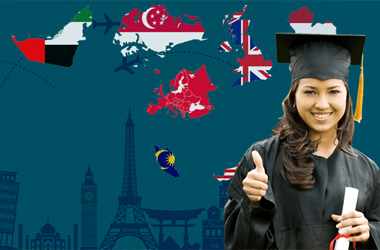Services
Our Services
We provide following services

Study Visa
A study visa permits international students to enter and stay in a foreign country for educational purposes. It typically requires proof of admission, financial stability, and meeting the country's immigration requirements.

Visitor Visa
A visitor visa allows individuals to travel to a foreign country for short-term stays, typically for tourism, business, or family visits. It requires proof of travel purpose, financial stability, and a return plan.
General Requirements for Study Visa:
If you’re planning to study abroad, one of the essential steps in the process is obtaining a study visa for your destination country. While specific requirements may vary depending on the country and type of program you are applying for, there are several general requirements that most countries follow when granting a study visa.
1. Valid Passport
- A valid passport with a minimum of 6 months validity beyond the date of your intended stay is a fundamental requirement for any study visa application.
2. Acceptance from a Recognized Institution
- You must be accepted by a recognized educational institution or university. The institution will provide you with an acceptance letter or offer letter, which is a key document required for the visa application process.
3. Proof of Financial Support
- Most countries will require proof that you have sufficient funds to support yourself during your studies. This could include bank statements, affidavits of financial support from sponsors, or proof of scholarship funding.
4. Proof of English or Language Proficiency
- Depending on the country and your program, you may need to provide proof of language proficiency (e.g., IELTS, TOEFL, or other recognized exams). This requirement ensures that you can understand and participate in academic programs conducted in English or the primary language of instruction.
5. Completed Visa Application Form
- You will need to complete the appropriate visa application form, which can usually be done online or at the local consulate/embassy. Ensure all details are accurate and up-to-date to avoid delays.
6. Visa Application Fee
- A non-refundable visa application fee is typically required when submitting your application. The fee amount varies by country, so make sure to check the specific details for your destination country.
7. Medical Examination (if required)
- Some countries require international students to undergo a medical examination or provide proof of good health to ensure that they do not pose a health risk to others. You may also need to show proof of vaccinations depending on the country’s health policies.
8. Police Clearance Certificate (if required)
- Some countries require a police clearance certificate to ensure that you have no criminal record and are considered a good candidate for studying abroad.
9. Statement of Purpose or Cover Letter
- A statement of purpose (SOP) or cover letter is often required to explain your intention to study, why you chose your specific course and institution, and your future plans after completing your studies.
10. Biometric Data (if required)
- Some countries require biometric data (fingerprints and photographs) as part of the visa application process. This is usually taken during the visa submission at the embassy or consulate.
11. Travel Insurance
- Some countries require students to have valid travel or health insurance for the duration of their stay, ensuring coverage for any medical emergencies or accidents while studying abroad.
12. Return or Departure Plan
- A return ticket or proof of a departure plan may be required to assure authorities that you intend to leave the country upon the completion of your studies.
13. Additional Documents (Varies by Country)
- Depending on the destination country and your specific situation, additional documentation may be required. These can include academic transcripts, recommendation letters, or a student visa interview.
Tips for a Successful Study Visa Application:
- Start Early: Visa applications can take time, so it’s important to begin your application well in advance of your intended start date.
- Follow the Guidelines: Make sure you meet all the specific requirements set by the country’s embassy or consulate.
- Seek Expert Help: If you’re unsure about any step, consider seeking guidance from a professional immigration consultant to ensure you don’t miss any critical requirements.
The study visa process can seem overwhelming, but with proper preparation and attention to detail, you can successfully navigate the application process and embark on your academic journey abroad!
General Requirements for Visitor Visa:
A visitor visa allows individuals to enter a country for a temporary stay for tourism, business, or family visits. The specific requirements for a visitor visa can vary depending on the country, but here are some general guidelines that are commonly needed for most countries.
1. Valid Passport
- You must have a passport that is valid for at least six months beyond the date of your intended departure from the country you’re visiting. Ensure that your passport has enough blank pages for visa stamps.
2. Completed Visa Application Form
- The first step in applying for a visitor visa is filling out the visa application form. Depending on the country, this can be done online or at the consulate/embassy. It’s important to ensure that all the information you provide is accurate and truthful.
3. Visa Application Fee
- Most countries require a non-refundable visa application fee. The amount varies depending on the country and the type of visa. Be sure to pay the required fee before submitting your application.
4. Proof of Financial Support
- You must demonstrate that you have sufficient funds to cover your travel expenses during your stay. This can include bank statements, pay slips, or sponsorship letters if someone else is funding your trip.
5. Purpose of Visit
- You will need to provide a clear explanation of the purpose of your visit. This could be for tourism, business meetings, attending events, or visiting family. Documentation like an invitation letter, travel itinerary, or conference details may be required to support your application.
6. Travel Itinerary
- You may need to provide your travel itinerary, showing your planned arrival and departure dates, accommodations, and intended activities during your stay. This helps prove that your visit is temporary.
7. Proof of Ties to Your Home Country
- To ensure that you will return to your home country after your visit, you may be asked to show proof of strong ties. This could include employment letters, property ownership, family commitments, or evidence of financial responsibilities in your home country.
8. Medical Insurance (if required)
- Some countries require visitors to have travel or health insurance for the duration of their stay. The insurance should cover any medical emergencies or unexpected situations during your visit.
9. Photographs
- Recent passport-sized photographs that meet the specific size and quality standards may be required as part of your visa application.
10. Police Clearance Certificate (if required)
- In some cases, countries may require a police clearance certificate to prove that you do not have a criminal record. This is typically more common for long-term visitors or individuals applying for multiple-entry visas.
11. Previous Travel History (if applicable)
- A good travel history, such as previous visits to countries that require visas, can strengthen your application. Evidence of your travel history (stamps or visas in your passport) can help prove that you are a responsible visitor who complies with visa rules.
12. Biometrics (if required)
- Some countries require biometrics (fingerprints and photographs) as part of the visa application process. Biometrics are typically taken at the embassy or consulate when submitting your application.
13. Return Ticket
- You may be required to show proof of a return ticket or onward travel to demonstrate that you have plans to leave the country once your visit ends.
14. Additional Documents (Varies by Country)
- Depending on the country, additional documents may be needed. For example, an invitation letter from a friend or family member, hotel bookings, or tickets for events you plan to attend during your visit.
Tips for a Successful Visitor Visa Application:
- Apply Early: Visa processing can take time, so apply well in advance to avoid any last-minute stress.
- Follow the Instructions Carefully: Ensure that you provide all required documents and meet the specific requirements of the country you are visiting.
- Be Honest: Always provide truthful information on your visa application. Any false or misleading details could result in denial of your visa.
- Seek Professional Help: If you’re unsure about the process or need assistance gathering the required documents, consider consulting a professional immigration expert to guide you through the process.
While the requirements for a visitor visa can vary by country, understanding these general guidelines will help you prepare and ensure a smooth application process. Safe travels!
